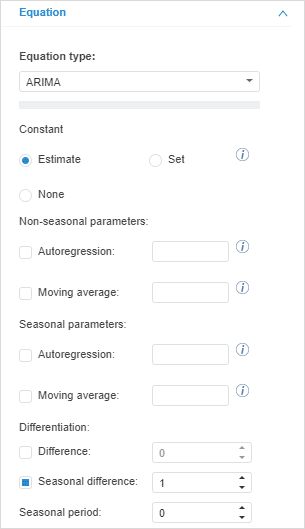 To display the tab
To display the tabThe ARIMA model is one of the most popular models that are used to make short-term forecasts.
NOTE. In the ARIMA method the input variable also serves as the output variable. To create an equation, set the variable binding to itself.
To set up method parameters, use the Equation side panel tab.

Method parameters:
Constant. Specify the calculation method for the constant:
Estimate. The constant value is estimated automatically in the method calculation process. The obtained value is displayed in the given parameters group.
Set. The value of constant is specified by the user in the corresponding box that becomes available after this radio button has been selected.
None. Default. No constant is used in the model.
Non-Seasonal and Seasonal Parameters. Set non-seasonal or seasonal parameters of the method:
Autoregression. The checkbox is deselected by default. If the checkbox is selected, the specified order of the non-seasonal or seasonal autoregression is taken into account.
Moving Average. The checkbox is deselected by default. If the checkbox is selected, the specified order of non-seasonal or seasonal moving average is taken into account.
NOTE. If the ARIMA method is calculated, entered numbers or order ranges of seasonal or non-seasonal moving average and seasonal or non-seasonal autoregression are separated by commas. Order range is specified using the "-" character. For example: 1-3,5,7-9.
If the ARIMA (R) method is calculated, autoregression parameters and moving average parameters are defined as a value range 1-N. Set the maximum order of N.
If order of autoregression or moving average is set for the ARIMA method, the side panel shows the Parameters of ARMA Estimation tab used to set up parameters of autoregression or moving average.
Differentiation. Set differentiation parameters for the source series and the seasonal component:
Difference. The checkbox is deselected by default. If the checkbox is selected, the specified order of differentiating non-seasonal or seasonal series component is taken into account. The default value is - 1.
Seasonal Difference. The checkbox is selected by default, and the differentiation order of the seasonal component is taken into account. The default value is - 1.
Seasonal Period. It is considered if the seasonal difference is used to calculate a model. The seasonal period determines the length of the seasonal period (for example, four quarters or twelve months). The default value is 0.
Confidence Limits Relevance. Set the confidence limits relevance level for a forecasting series. Values are obtained from the range (0, 1). The default value is 0.95.
To estimate quality of obtained equation, use diagnostic tests. To run the tests, use the Fore language.
See also:
Working with Equations | The ARIMA Method | Time Series Analysis: IModelling.Arima